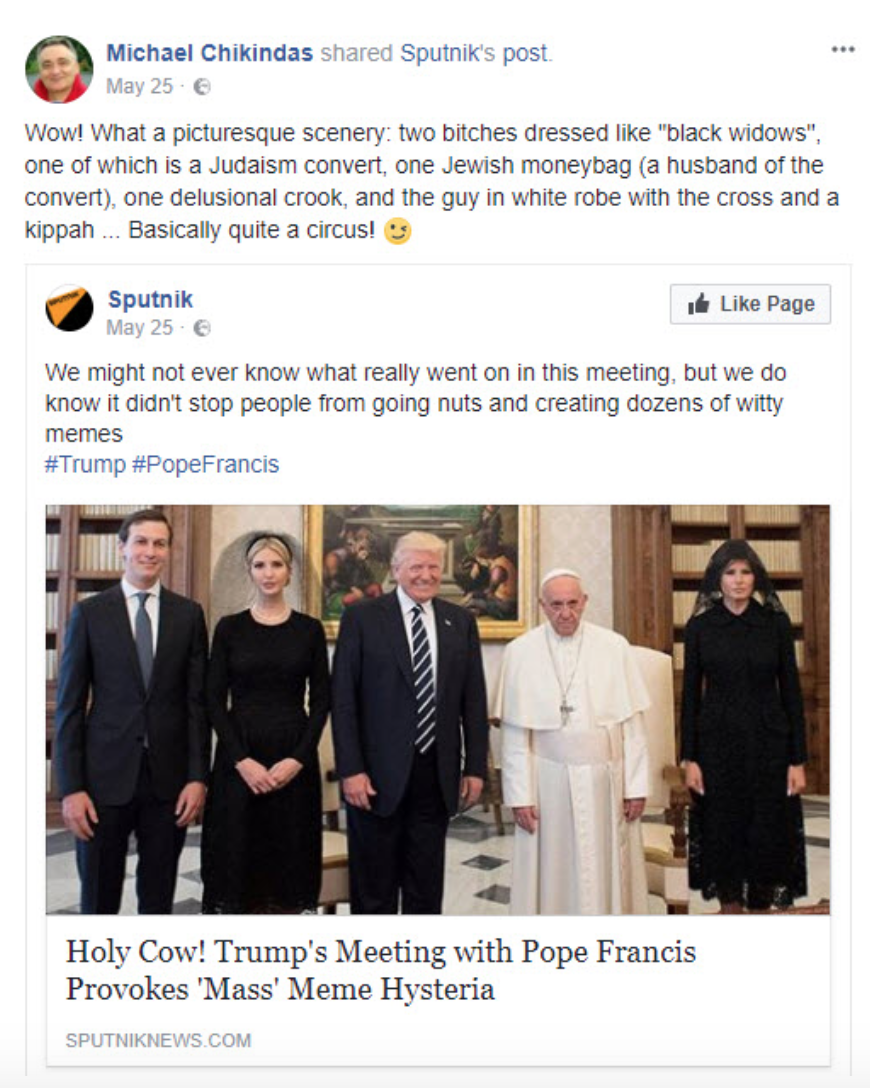You have /5 articles left.
Sign up for a free account or log in.
This article contains explicit and potentially offensive terms that are essential to reporting on this situation.
Rutgers University at New Brunswick is investigating a professor’s anti-Semitic Facebook posts to see if anything he shared violates the institution’s nondiscrimination policy. The professor doesn’t explicitly deny posting racist images, suggesting that Jews are responsible for the Armenian genocide or declaring, “These jewish [sic] motherfuckers do not control me. They can go and fuck each other in their fat arses.”
But Michael Chikindas, a professor of food science, does say his Facebook account was “hacked.” So he says he can’t be sure that he personally shared everything on the page.
“Because my public domains and my personal PC were HACKED,” Chikindas said via email (emphasis his, here and throughout), “I restrain myself from any comments on the content of my page as I cannot be sure anymore if what is being referred to is mine or modifiyed [sic] by those who hacked my domain.”
Chikindas further explained that a blog post highlighting the anti-Semitic messages linked to his Facebook page, somehow making its private content available to the public. His personal photographs were then “manipulated (changed to make me look ugly-fat),” he said, “and comments from those who were not included as my friends started to appear, nasty, insulting, health- and life-threatening comments.”
That was earlier this week. Chikindas’s Facebook page has since been taken down. But news websites, blogs and Twitter users continue to post screen shots of undeniably anti-Semitic content reportedly taken from the page. Here are a few shared by The Times of Israel and The Algemeiner.


The latter publication, a Jewish newspaper based in the U.S., reported extensively on Chikindas, sharing additional comments he allegedly made. They include, “We must not forget that the Armenian genocide was orchestrated by the Turkish Jews who pretended to be the Turks,” and “Israel, the country of the Jews and for the Jews, has one of the highest percentage of gays in the world.” Other examples abound.
Chikindas said via email that he does not identify as an anti-Semite and that it is his “lifelong credo that all people are born equal regardless of their ethnicity, religion and wealth. I am equally intolerant to all forms of racism, without any exclusions.”
Arguing that anything he’d shared was anti-Zionist, and not anti-Semitic (even though many of his alleged posts refer to Jews, not Israelis or Israel), Chikindas added, “Should I knew [sic] that sharing these freely available pictures questioning Zionism on possible racist actions can be seen as anti-Semitic, I would never do it. I strictly separate anti-Semitism from intolerance to Zionism.”

Chikindas also said he’d received hateful messages in response to the news about his posts, many of them from Israel-based Russians, “and these messages are of a questionable racist nature as I am referred to as a goyim [non-Jewish person], and my health and life are being threatened. I FEEL EXTREMELY INSECURE WITH MY HEALTH AND LIFE BEING THREATENED IN NUMEROUS WRITTEN AND VERBAL MESSAGES.”
Rutgers said in a statement that Chikindas’s statements are “antithetical to our university’s principles and values of respect for people of all backgrounds, including, among other groups, our large and vibrant Jewish community. Such comments do not represent the position of the university.”
As for free speech, Rutgers said its position is “clear: all of the members of our community, including faculty and staff, are free to express their viewpoints in public forums as private citizens.” Yet the university must also foster an environment free from discrimination, it said, and is therefore “reviewing this matter to determine if actions taken in the context of [Chikindas’s] role as a faculty member at Rutgers may have violated that policy.”
Chikindas’s predicament recalls that of Joy Karega, a former assistant professor of rhetoric and composition studies whom Oberlin College fired last year for past anti-Semitic statements and falsehoods she posted on Facebook. Oberlin initially backed Karega’s right to free speech but investigated her comments after a push from its Board of Trustees; the Ohio college cited a lack of professional fitness in its final decision, in which faculty committees were involved.
Some Oberlin faculty members initially defended Karega, saying that she, as a young black woman, was being scapegoated for larger concerns about anti-Semitism and racial justice more broadly on campus. But she was terminated with little to no protest from the faculty, at least publicly.
Leaders of the American Association of University Professors- and American Federation of Teachers'-affiliated faculty union at Rutgers said Thursday that they are aware of the Chikindas case but are not commenting on it.
Rutgers said Chikindas is still teaching there this semester.
John K. Wilson, an independent scholar of academic freedom and an editor of the national AAUP’s “Academe” blog, said that while Chikindas's views “are both stupid and offensive,” they’re “also fully protected by academic freedom.”
Describing Rutgers’s statement as vague, Wilson said it’s unclear if Chikindas is being investigated on the basis of a complaint about his work, an act of discrimination as a professor, or merely private social media activity. While either professional claim would be legitimate, if, he said, “Rutgers is investigating offensive Facebook posts, that's a troubling message to send to the campus.”
Wilson drew a comparison between Chikindas and another professor facing backlash for public statements: George Ciccariello-Maher, an associate professor of politics and global studies at Drexel University. That institution has long had its eye on Ciccariello-Maher for his tweets, which are not anti-Semitic but have been called inflammatory for other reasons. But it only recently suspended him -- later allowing him to resume teaching online -- on the grounds that it was necessary for his personal protection, as he was receiving threats.
“Rutgers may use the email death threats sent from around the world as an excuse to suspend Chikindas, as a subterfuge to appease his critics and punish him while pretending to still protect free speech,” Wilson said. “Let's hope they don't try that approach.”
Still, other academics elsewhere have condemned Chikindas online. AAUP in general says that professors’ public statements may merit investigation if they suggest a lack of professional fitness. But such an action must happen in conjunction with the faculty.





